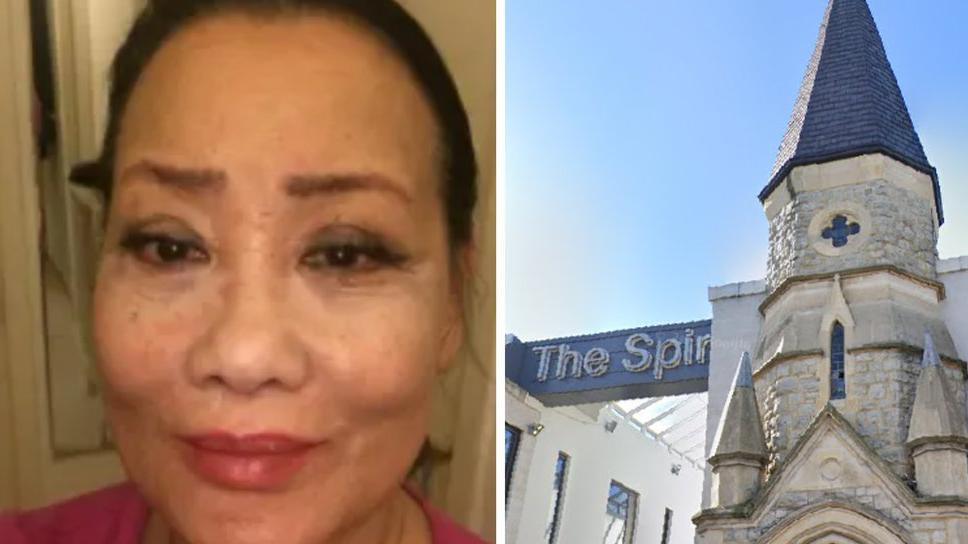Woman strangled and dumped in bin, court hears

Louise Kam was last seen near The Spires shopping centre in Barnet, north London
At a glance
Businesswoman Louise Kam, 71, disappeared in July 2021 and was later found dead
Kusai Al-Jundi, 24, from Harrow and Mohammed El-Abboud, 28, from Barnet deny murdering Ms Kam
Their trial has opened with jurors hearing from the prosecution
- Published
Two men are accused of strangling a 71-year-old woman and dumping her body in a bin in a plan to take control of her finances, the Old Bailey has heard.
Louise Kam, of Potters Bar, Hertfordshire, disappeared in July 2021 and was last seen at The Spires shopping centre in north London.
Prosecutor Oliver Glasgow KC told the court that friends thought texts supposedly from Ms Kam did not seem like she had written them.
Kusai Al-Jundi, 24, of Harrow in north-west London, and Mohammed El-Abboud, 28, of Barnet in north London, deny murdering Ms Kam.
Opening the prosecution's case for the trial, Mr Glasgow KC said the plan was "hatched" by Mr Al-Jundi, a chef and delivery driver who worked in a restaurant in Willesden, north-west London.
Jurors heard Mr Al-Jundi had spent months befriending Ms Kam, trying to deceive her into giving him control of two properties she owned in Willesden and Barnet and to sign over control of her finances to him.
The other defendant, Mr El-Abboud, who worked as a delivery driver at the same restaurant, moved into one of Ms Kam's houses and began to "treat her property as his own", the jury was told.
'Plunder life savings'
The trial heard Ms Kam believed she had been offered millions of pounds for the properties by Mr Al-Jundi, and that she intended to use the money to pay off a mortgage and purchase a property for her children.
Mr Glasgow told jurors the deception reached its conclusion on 26 July 2021 when Ms Kam arrived at her house in Barnet expecting to finalise the sale of the property.
She was with the two defendants for about 20 minutes, and while both men were seen leaving the address she never reappeared, the court was told.
"Louise Kam must have been killed that same afternoon and whilst she was at the address, because she was never seen alive again," Mr Glasgow alleged.
Later that afternoon, Mr Al-Jundi began to use Ms Kam's mobile to send messages to her friends and family pretending she had gone on holiday, the Old Bailey was told.
"Little did those closest to her realise that when they were replying to those messages, Louise Kam was already dead," Mr Glasgow said.
"She had been strangled, her body dumped unceremoniously in a rubbish bin, and a plan was afoot to conceal her murder and plunder her life savings," he told the court.
'DNA found'
The defendants had then embarked on a cover-up, alleged Mr Glasgow, with Mr El-Abboud selling Ms Kam's car to an unsuspecting buyer and moving the bin in which the victim's body had been hidden.
Mr Glasgow told the court both defendants were "conclusively" linked to Ms Kam's death, with Mr Al-Jundi's DNA recovered by police from a pair of gloves, as well as one of the plastic bin bags found with Ms Kam's body.
Mr El-Abboud's DNA was found on a hair dryer from which the electrical flex had been removed and used to strangle Ms Kam, the jury heard.
Her blood and DNA were also discovered on a jumper Mr El-Abboud was wearing the day she was killed, the court heard, and on a second pair of gloves found with her body.
Jurors were told that after Ms Kam died, Mr El-Abboud admitted to a friend that he had killed her on the instruction of Mr Al-Jundi.
"It is the Crown's case that Louise Kam was the victim of a careful and cunning plan by Kusai Al-Jundi to defraud her, and when that plan did not work out as he hoped, he and Mohamed El-Abboud killed her," said Mr Glasgow.
"It does not matter who overpowered her, who wrapped the flex around her neck, or who bundled her lifeless corpse into the bin," he added.
"What matters is that the two of them did this together and that each supported the other in the plan to kill her, to dispose of her body and to try and profit from her death."
The trial, expected to last five weeks, continues.